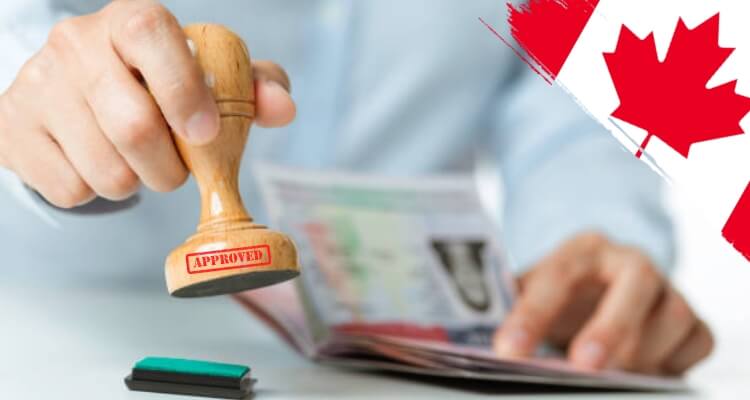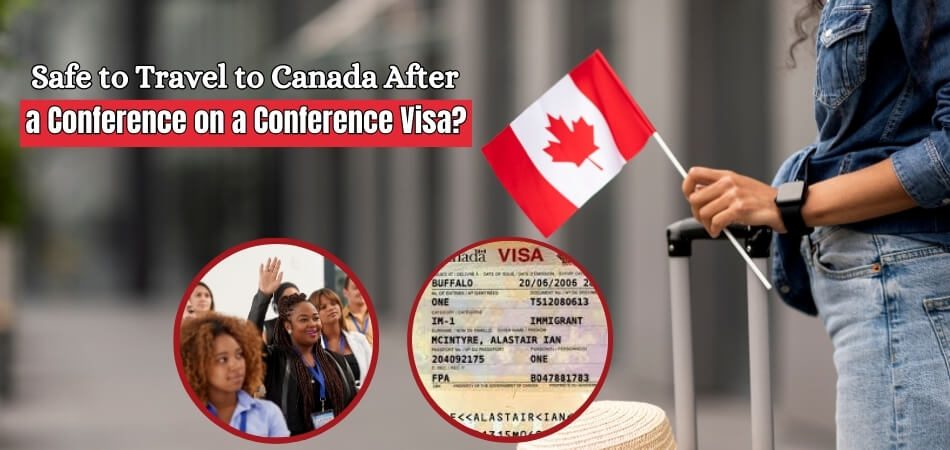Traveling to Canada for a conference opens up a world of professional networking and cultural exploration. The Canadian conference visa allows attendees to visit the country for business meetings, seminars, and industry events, making it a popular choice for international professionals. But is it safe to travel to Canada after a conference on a conference visa?
Yes, its completely safe as long as you hold a multiple-entry visa and follow all visa conditions. Staying aware of any grace periods and ensuring your visa remains valid are essential steps to avoid immigration issues. As long as you double-check your visa details before departing, you’re set for a smooth post-conference visit.
If you want to have a stress-free experience traveling in Canada, learn the must-know guidelines that you will need to know.
Which Visas Are Considered Conference Visas in Canada?
When attending a conference in Canada, choosing the correct visa is essential for a smooth and legal entry. Canada offers specific visa options tailored for conference visitors, each with unique requirements and benefits. Here’s a breakdown of which visas are considered conference visas and what each entails.

Temporary Resident Visa (TRV)
The Temporary Resident Visa, or TRV, is common for visitors attending conferences in Canada. It’s intended for short stays and allows visitors to engage in activities like conferences and meetings, such as the global conference in canada 2024. Applicants need to demonstrate their intent to return to their home country once the conference concludes. This visa requires proof of purpose, financial support, and an itinerary to support your stay.
Business Visitor Visa
The Business Visitor Visa allows international professionals to enter Canada for short-term business activities, including attending conferences. Unlike work permits, this visa covers non-employment activities, such as participating in meetings and training. It’s perfect for those who need to meet business contacts and explore professional growth without engaging in Canadian employment. This visa is particularly suited for people looking to expand their networks internationally.
Electronic Travel Authorization (eTA)
For visitors from visa-exempt countries, the Electronic Travel Authorization (eTA) provides an efficient option for attending conferences in Canada. It’s electronically linked to your passport and grants permission for short visits. The eTA is valid for five years or until your passport expires, whichever comes first. It’s an ideal choice for frequent travelers who may return for future conferences or meetings.
Global Skills Strategy Visa
Designed to facilitate fast entry for highly skilled professionals, the Global Skills Strategy Visa covers specific conferences and business events. It offers priority processing, often within two weeks, making it ideal for last-minute conference plans. This visa is aimed at specialized fields like technology and engineering, where rapid knowledge exchange is beneficial. Applicants must meet skill requirements and provide documentation related to the event.
How Long Can I Stay in Canada with a Conference Visa?
The duration of your stay in Canada on a conference visa depends on the specific visa you hold. Most conference visas, like the Temporary Resident Visa (TRV), allow short stays, usually up to

If you’re attending a conference and wish to extend your visit, you may apply for an extension. This process requires submitting documents that justify your extended stay, like proof of ongoing activities. Approval for extensions isn’t guaranteed, so planning your time in Canada wisely is vital. Staying beyond your visa’s limit without permission can result in future travel restrictions or penalties.
Is It Safe to Travel to Canada After a Conference on a Conference Visa?
Attending a conference in Canada is an exciting opportunity to network and experience a new culture. But you might wonder if it’s safe to explore the country afterward on your conference visa. Let’s explore this question and the factors that can affect your post-conference travel plans.
Yes, it is generally safe to travel to Canada after your conference on a conference visa, as long as you adhere to the visa’s conditions. Your visa must remain valid for the duration of your extended stay, and you should not engage in activities beyond its scope. Always double-check your visa details to ensure a smooth and lawful journey throughout Canada.
Visa Validity Period
Your visa’s validity period determines how long you can legally stay in Canada. Check the expiry date to avoid overstaying, which can lead to legal issues. Immigration officers may also stamp your passport with a specific departure date upon entry.
Be mindful that the officer’s date takes precedence over the visa expiry. If given a departure date, you must leave by then, even if your visa is valid longer. Planning your travel within these timelines ensures compliance with immigration laws.
Single-Entry vs. Multiple-Entry Visas
The type of visa—single-entry or multiple-entry—affects your ability to re-enter Canada. A single-entry visa allows one entry; once you leave, you can’t return without a new visa. A multiple-entry visa lets you come and go during its validity.
If you plan to visit neighboring countries and return to Canada, a multiple-entry visa is essential. Without it, re-entry will be denied, disrupting your travel plans. Always verify your visa type before making international side trips.
Purpose of Stay
Your conference visa is intended for attending the event specified in your application. Engaging in tourism is generally acceptable, provided it fits within the visa duration. However, activities like work or study are not permitted without proper authorization.
Staying within the allowed activities prevents legal complications. If you wish to work or study, you must apply for the appropriate permits. Respecting the visa’s purpose safeguards your current and future visits.
Compliance With Visa Conditions
Adhering to all visa conditions is crucial for a trouble-free stay. This includes not overstaying and not engaging in unauthorized activities. Violating conditions can result in deportation and bans on future entries.
Keep all relevant documents accessible while traveling. Authorities may request to see your visa and identification at any time. Being prepared fosters positive interactions with officials.
Overstaying Risks
It is important to keep in mind that overstaying your visa, even for a short period, can have serious consequences. It may lead to detention, fines, and difficulties when applying for future visas. Always plan your departure well before your visa expires. However, if your plans shift, such as considering changing a conference visa to work permit, be aware that this process has specific criteria and isn’t automatically approved.
If unforeseen circumstances occur, you can apply for a visa extension. Submit the application before your current visa expires to maintain legal status. It’s best to stick to your original plans since approval isn’t guaranteed.
Re-entry Considerations
If you exit Canada and wish to return, your visa must permit re-entry. Without a multiple-entry visa, you won’t be allowed back in without reapplying. This is vital if you’re touring other countries during your trip.
Ensure all travel documents are up-to-date and valid for re-entry. This includes your passport and any necessary visas for other destinations. Proper documentation prevents unnecessary travel disruptions.
Immigration Officer’s Discretion
Immigration officers have the authority to grant entry and set conditions. They may limit your stay or ask about your travel plans. Being honest and providing clear information helps facilitate the process.
Respecting their decisions is important, even if it alters your plans. Arguing or providing misleading information can lead to denial of entry. Such cooperation ensures a smoother experience at border control.
How to Find an Appropriate Visa for Attending a Conference?
Attending a conference in Canada requires selecting the appropriate visa for a smooth and legal entry. Different visas have different requirements, so it’s essential to pick the one that matches your specific travel purpose. Here’s a step-by-step guide to help you identify and secure the right visa.
Step 1: Determine Your Visa Eligibility
Begin by checking your eligibility for various Canadian visas, as this is essential to narrow down your options. Some visitors may qualify for an Electronic Travel Authorization (eTA), while others will need a Temporary Resident Visa (TRV). Make sure to review the eligibility criteria for each option carefully to avoid confusion. Knowing your eligibility will help save time and make the application process easier.
Step 2: Identify the Purpose of Your Visit
Clarify the purpose of your conference trip to determine which visa type best fits your needs. If your visit solely involves attending a conference, a business visitor visa or TRV may be suitable. For more specific conference roles or extended stays, different visas may apply. Matching the visa type to your purpose reduces the risk of application errors.
Step 3: Gather the Required Documentation
Each visa type requires specific documents, so start gathering them as soon as you decide on the visa. Common documents include your conference invitation, proof of funds, and travel itinerary, though some visas may need additional paperwork. Make sure all documents are current and correctly formatted to avoid delays. Being prepared with the required documents can make your application smoother and faster.
Step 4: Apply in Advance to Avoid Delays
Visa processing times can vary, so applying well in advance of your travel dates is always a good idea. Early application provides a buffer against potential delays, ensuring you have the visa before the conference begins. Rushing the process could lead to mistakes, so give yourself ample time to complete each step. Timely application helps you avoid stress and makes your travel plans more flexible.
What Can You Do With Your Visa for a Conference in Canada?
With a conference visa, you have various opportunities to explore both professionally and personally during your time in Canada. Beyond attending the event, there are several permissible activities that make your visit worthwhile. This guide covers what you can legally do while on a conference visa, maximizing both networking and cultural experiences.
Attend All Conference Sessions
Your visa allows full participation in conference sessions, letting you gain valuable insights and connect with industry experts. Engaging in workshops, seminars, and discussions is a great way to learn and grow professionally. You can also build connections by asking questions and networking with presenters. Make the most of every session to gain knowledge relevant to your field.
Join Networking Events and Meet-Ups
Networking events are often held alongside conferences, allowing visa holders to connect with like-minded professionals. These gatherings give you a chance to discuss potential collaborations and future projects. Taking part in networking sessions adds value to your conference experience by expanding your professional circle. Ensure you exchange contact details to keep the conversation going after the event.
Travel Locally and Explore Nearby Attractions
While in Canada, you’re free to explore local sights and experience Canadian culture outside conference hours. This might include traveling as a tourist post-conference, as many attendees take time to relax and discover the country. From historic sites to natural beauty, Canada offers unique experiences in every city. Just remember to follow visa guidelines if you extend your stay.
Attend Business Meetings Related to the Conference
If your conference leads to further discussions or potential partnerships, you can attend related business meetings on your visa. This could include formal or informal meetings with prospective partners who share your professional goals. Such meetings are permitted as long as they align with the conference’s purpose. Take advantage of these discussions to strengthen professional ties.
Participate in Training or Educational Workshops
Many conferences include workshops or training sessions for skill enhancement, which are permissible under your visa. These workshops allow you to learn hands-on techniques and gain new industry knowledge. Engaging in additional training sessions can improve your skills and enhance your professional development. Just ensure the workshops are part of the conference and approved for your visa.
FAQs about Is it Safe to Travel to Canada After a Conference on a Conference Visa?
Traveling to Canada on a conference visa brings questions about post-conference stays and compliance with visa terms. Here are some frequently asked questions to guide a safe and smooth journey after attending your conference in Canada.
Can I Extend My Stay in Canada After the Conference?
Yes, you can apply to extend your stay, but you must do so before your visa expires. An extension is not guaranteed, so ensure your request aligns with Canada’s immigration guidelines and plan alternative arrangements if necessary.
Do I Need a Multiple-Entry Visa to Leave and Re-Enter Canada?
Yes, a multiple-entry visa is required if you plan to exit and return to Canada after the conference. A single-entry visa only permits a one-time entry, so ensure you have the correct visa for re-entry.
Are There Restrictions on Traveling Within Canada After the Conference?
No, you can travel within Canada after the conference as long as your visa remains valid. This allows you to explore Canadian cities and attractions, providing you comply with all visa conditions and departure requirements.
What Happens If I Overstay My Conference Visa?
Overstaying your visa can result in penalties, including fines, detention, or restrictions on future Canadian travel. Always check your visa’s expiration date and plan to leave or apply for an extension well before it expires.
Can I Transition to a Tourist Visa After the Conference?
Switching from a conference visa to a tourist visa typically requires a new application. You must submit this before your conference visa expires and meet all tourist visa requirements to stay legally within Canada.
Will My Conference Visa Allow Me to Work in Canada Post-Conference?
No, a conference visa doesn’t authorize employment within Canada. If you plan to work after the conference, you must apply for a work permit or the appropriate visa before engaging in any employment-related activities.
Final Considerations
When you travel to Canada for a conference, you have the opportunity to network, to enhance your skill set, and to explore the culture of the country. Staying compliant with visa conditions ensures a smooth experience, allowing you to focus on making the most of your visit. Is it safe to travel to Canada after a conference on a conference visa? Absolutely—provided you have a multiple-entry visa, adhere to its terms, and remain aware of any restrictions.
Preparing documentation, understanding visa types, and respecting Canadian immigration guidelines make your journey worry-free. With the right planning, your Canadian conference experience can be both enriching and enjoyable.






